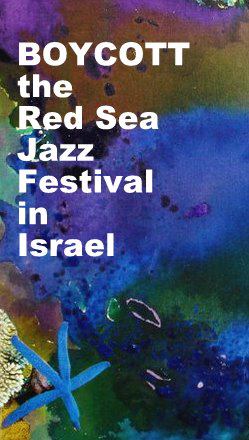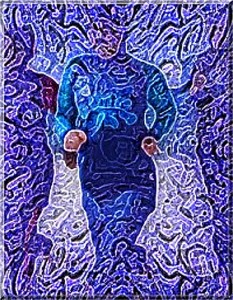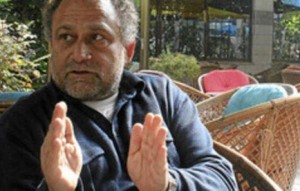
“When Mexico bleeds, and no one listens, who suffers. Would you play in a festival in Mexico that was supported by corrupt officials, the ones who feed into the violence epidemic sweeping Mexico? Do you not know that the Zapatistas have a history of supporting Palestinian human rights causes? You may think what is happening to the Palestinians is wrong but your willing nature to participate in celebration for their oppressors shows more of your character than your words offer. If music is beauty, what beauty lies in playing for a festival in which the native (like you are native to your country) population could not even attend because of humiliating checkpoints placed to break the spirit of said population. What if one day you were not allowed to return to Mexico because the government had taken over your land and placed more ideal residents there? Would you play for a government endorsed jazz festival. Do you think you’d be playing for the people then?”
Sonia continues on her Facebook wall:
Music, as I was taught, is a form of artistic expression and part of my being as an artist is an unwavering resolve to speak out against the bullshit my government supports.
music is “awesome” when the people making it behave “awesomely”
To a Zionist who attempts to smear and intimidate her, Sonia replies
I peacefully revolt for the future of mine and because I am a true mother who understand no mother should have to watch her child suffer at the hands of MY government. I will speak for the rights of your children, even if you choose to blind them in ignorant privilege. I do not want your children and my son to have to carry the burden your apathy will leave on the shoulders of future generations.
So, I hope they’re watching. I hope they see every video and link I post. You have just tried to make me fear my government, sir. I am not scared of you or they.
On Israel’s expulsion of Bedouins from the Negev under the Prawer Plan:
Right now, Israel’s Prawer Plan is displacing 70,000 Arabs from the Nagev Desert. People not allowed to enjoy your show. By playing in a government supported/endorsed cultural event, you are effectively distracting from and supporting this action.
…
Would you have played in apartheid South Africa? Would you have played for colonizers and settlers during Manifest Destiny? Stevie Wonder, Roger Waters, Elvis Costello, Chris “Daddy” Dave, and many others have joined the cultural boycott. What makes them over the top and you so correct?
…
Palestinians would not be allowed to put on such a lavish festival, just look at what they had to go through to put on a marathon. To suggest Palestine would even have enough funds to put on a music festival (because they would have to be allowed by the colonizing government to put on a music show on their own land and already live in inhumane conditions) shows mis-education on the the reality of the apartheid. I’m talking about independent and internationally recognized violations of human rights. Over 200 resolutions by the UNSC that only remind the apartheid state needs to heed the treaties they already agreed to but choose to violate at every turn.
….
You may play for people, but the government uses your silence to white-wash a very serious issue. You want to be a puppet? Fine, but then don’t get uppity when people call you a puppet. You could have joined Chris Daddy Dave and Palladino, the Matt Schofield Band, Salif Keita, Stanley Jordan… you could have become an educated artist. You could have done research and requested to visit Hebron, using activist escorts, so you could see for yourself how ridiculous the notion is that you are somehow lifting people up by playing the Red Sea Jazz Festival (which sounds like a pretty piece of propaganda from a brochure or something)
I am sure you are not watching these videos, why would you, confronting fact isn’t easy. But, in the event your curiosity and ethics grab hold, here is what you are really helping to “lift up” in a dire political situation (the dire situation isn’t political, it’s about basic human rights). You were saying “yes” to house demolitions, “yes” to peaceful demonstrators being pelted with uncovered and broken rubber bullets, “yes” to checkpoints, “yes” to ethnic cleansing with every hit. Your grooves translated into “yes” for kidnapping children in the middle of the night, “yes” to the illegal settlements (all settlements are illegal under international law), “yes” to the constant oppression and fear that Palestinians live through on a daily basis.
The reality you didn’t play for people, the amazing people of Judaic faith fighting the occupation that is being carried out in their name, you helped zionists. And, that, at the end of the day, is something you must live with. Every time Amnesty International finds a new study showing a more violations by the IDF, every time B’Tselem ???? has to demonstrate, every time a refusenick is jailed for not wanting to serve the oppressor, your name will be on the side of the system, not the people
Antonio Sanchez, whom Sonia Montez is addressing, replaced Chris Daddy Dave and the Drumhedz, who, along with the Matt Schofield Trio, cancelled performances at the Red Sea Jazz Festival held in Israel in August.
Related Links
Sonia Montez – Of Tears and Honey
A Bicycle Ride In The Park







